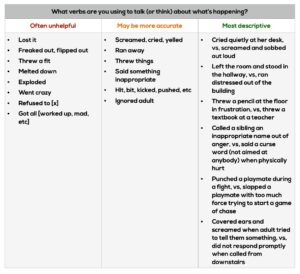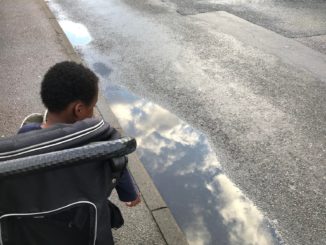If I could get everybody in the world to learn one concept about the way they interact with children…well, actually, I have about a bazillion that I might choose from. I’m pretty bad at choosing.
But if I could get everybody to learn, like, 15 concepts…I think one of my top choices would have to be speaking about kids with precise language.
It affects me as a provider, yes; I’m definitely being a little bit selfish by wishing that people would know how to more precisely tell me what it is that they mean. But I think it’s important for our inner voice, too. Even if nobody was speaking to me to try to explain to me what their thoughts are about a child, I would still want them to say more precise things in their own head about their child.
Here are a couple of examples of what I mean. No judgment at all if you hear yourself in these examples — I hear myself in these examples.
“He just absolutely lost it in class. He freaked out, he completely freaked out. The class had to be moved out of the room because he was just losing it. There was no reaching him! He just lost it. Then the crisis intervention team had to be called.”
“She just never listens. This morning she just wouldn’t listen to anything I said. I told her to put her shirt on and she just wouldn’t. It’s always like that. She just does what she wants and doesn’t do anything I say.”
Can you hear how both of these examples don’t factually describe the events of what happened? I don’t even mean from a, “give kids the benefit of the doubt” type of direction. For all I know, both kids could totally be in the wrong here. (Although you know I doubt that. 😉 ) I just mean from a literal standpoint, of what words mean and describe. These two paragraphs are literally not giving me, the OT or the fellow parent or whatever I am in that context, any helpful information.
What is “lost it”? What is “freaked out”? What did trying to “reach him” look like? What is “listening”? What is “just wouldn’t”? What does “does what she wants” look like?
The first situation could be describing a child silently sobbing uncontrollably at his desk, or curling up in a ball beneath his desk. It could be describing a child screaming at the top of his lungs or saying obscenities. It could be describing a child throwing objects.
(Honestly, in my professional experience, even “screaming”, “crying”, and “throwing objects” are words that are hugely subject to interpretation! I’ve had events happen in front of me where one adult described it as “He threw a chair at the teacher” and another adult describes it as “He pushed a chair and it fell over in front of the teacher”. But these more descriptive verbs do at least give me a better idea of what was factually happening at the time of the event that the adult is now trying to tell me about.)
The second situation could be describing a child who’s halfway across the house from a parent yelling commands by the door and the child literally doesn’t hear them. It could be describing a child who’s deeply engaged in her play and doesn’t respond to what the parent says even with the parent next to them. It could be describing a child who takes 30-60 seconds to process what the parent is saying, as children often do, and believes herself capable of wrapping up what she’s doing first, as children often do, and to the parent this looks like a 2-3 minute delay. It could mean a child whose relationship with their parent is in such a state of disconnection that they’re grasping for power wherever they can, stomping their feet and yelling that they don’t want to put their clothes on. It could be a child who’s desperately trying to communicate that the shirt they’re having to wear is causing a sensory issue for them.
Adults who can convey these things to me in more descriptive words are much more likely to get a helpful answer from me.
And even adults who can convey these things in their own mind — in my experience — have an easier time responding to their child with empathy. Even if it doesn’t help lead to answers! It still helps lead to empathy and compassion.
In your own head, instead of, “He’s being a jerk to his brother again!” you can describe what it is you’re seeing: “This is the third time this morning that they’ve ended up fighting over who gets to play with that toy.”
In my own personal experience, and in my own personal head, if I’m in a bad headspace, my brain will actively try to resist re-categorizing and describing this way…because my brain knows that it leads to me seeing my child with empathy and compassion instead, and immediately beginning to see solutions, and my brain is *tired* and wants to just be able to write off the situation as “he’s being a jerk” and be grumpy and call it a day. So sometimes it helps to back up one step even further and approach my own self with empathy and compassion first: “I am exhausted, I didn’t sleep well last night. I’m hungry, it’s about time for me to eat. No wonder it’s bothering me so much that they’re yelling, raised voices really bother me.”
And sometimes, after somebody’s seen me with empathy and compassion (even if that somebody is me), then it makes it a little easier to see somebody else that way, too.
In the image attached to this post, I give some examples. They tend to sound more clinical, because that’s how my mind works…since I work in this as a profession! But I think it can be helpful for home, too, not only if you’re talking to a professional. I think moving from the “often unhelpful” column to the “may be more accurate” column is an amazing start, and it mostly focuses on what verbs you’re using to talk about what action you’re seeing that’s bothering you. I choose verbs because verbs are maybe the easiest to concretely change and describe without having to factor in all the bias that comes along with adjectives. Being able to move from the “may be more accurate” column to the “most descriptive” column really helps with being able to learn how to work toward solutions, and I give examples in the “most descriptive” column of how each of the things in the middle column could be two vastly different interpretations, and how more detail can help.

[Image description:
A table titled, “What verbs are you using to talk (or think) about what’s happening?”
There are 3 columns. One has a red title labeled “Often unhelpful”. Underneath this column are these behaviours:
Lost it
Freaked out, flipped out
Threw a fit
Melted down
Exploded
Went crazy
Refused to [x]
Got all [worked up, mad, etc]
The second is titled in orange, “May be more accurate”. Underneath this column are these behaviours:
Screamed, cried, yelled
Ran away
Threw things
Said something inappropriate
Hit, bit, kicked, pushed, etc
Ignored adult
The third is titled in green, “Most descriptive”. Underneath this column are these descriptions:
Cried quietly at her desk, vs, screamed and sobbed out loud
Left the room and stood in the hallway, vs, ran distressed out of the building
Threw a pencil at the floor in frustration, vs, threw a textbook at a teacher
Called a sibling an inappropriate name out of anger, vs, said a curse word (not aimed at anybody) when physically hurt
Punched a playmate during a fight, vs, slapped a playmate with too much force trying to start a game of chase
Covered ears and screamed when adult tried to tell them something, vs, did not respond promptly when called from downstairs
End description.]



